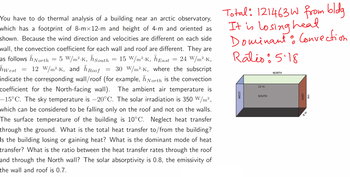
Elements Of Electromagnetics
7th Edition
ISBN: 9780190698614
Author: Sadiku, Matthew N. O.
Publisher: Oxford University Press
expand_more
expand_more
format_list_bulleted
Concept explainers
Question
find only the following
What is the total heat transfer to/from the building?

Transcribed Image Text:You have to do thermal analysis of a building near an arctic observatory,
which has a footprint of 8-mx12-m and height of 4-m and oriented as
shown. Because the wind direction and velocities are different on each side
wall, the convection coefficient for each wall and roof are different. They are
as follows h North 5 W/m².K, h South
24 W/m².K,
15 W/m².K, hEast
hwest
12 W/m².K, and hRoof = 30 W/m².K, where the subscript
indicate the corresponding wall/roof (for example, North is the convection
coefficient for the North-facing wall). The ambient air temperature is
-15°C. The sky temperature is -20°C. The solar irradiation is 350 W/m²,
which can be considered to be falling only on the roof and not on the walls.
The surface temperature of the building is 10°C. Neglect heat transfer
through the ground. What is the total heat transfer to/from the building?
Is the building losing or gaining heat? What is the dominant mode of heat
transfer? What is the ratio between the heat transfer rates through the roof
and through the North wall? The solar absorptivity is 0.8, the emissivity of
the wall and roof is 0.7.
-
=
=
=
Total: 121463W from bldg
It is losing heal
Dominant & Convection
Ráléo : 5.18
WEST
12 m
SOUTH
NORTH
EAST
4m
8m
Expert Solution
This question has been solved!
Explore an expertly crafted, step-by-step solution for a thorough understanding of key concepts.
This is a popular solution
Trending nowThis is a popular solution!
Step by stepSolved in 5 steps

Knowledge Booster
Learn more about
Need a deep-dive on the concept behind this application? Look no further. Learn more about this topic, mechanical-engineering and related others by exploring similar questions and additional content below.Similar questions
- QUESTION 1 A combined separating and throttling calorimeter is used to determine the dryness fraction of steam in a main supply. The pressure of the steam in the main and separator is 900kPa. After throttling the pressure is 160kPa and the temperature is 130°C. During a test 0.08kg of water is collected at the separator and 1.7kg of condensate is collected after throttling. Determine the: 1.1 dryness fraction of the steam in the main supply;arrow_forwardWhat form of energy from the list below is an extensive system property (choose all what apply) total energy of a system potential energy kinetic energy O internal energyarrow_forwardIt is a Thermodynamics subject please show the complete and step by step solution. Use the given format I inserted. Please answer it as soon as possible.arrow_forward
- Electrical discharge machining process, breakdown voltage across inter electrode gap (IEG) IS 300 V and the capacitance of the RC circuit is 50. The energy released per across IEG is?arrow_forwardThe candle flame is an example ofa. Open system, real and fixed boundaryb. open system, imaginary and variable boundaryc. Closed system, real and variable boundaryd. Closed system, imaginary and fixed boundaryarrow_forward
arrow_back_ios
arrow_forward_ios
Recommended textbooks for you
 Elements Of ElectromagneticsMechanical EngineeringISBN:9780190698614Author:Sadiku, Matthew N. O.Publisher:Oxford University Press
Elements Of ElectromagneticsMechanical EngineeringISBN:9780190698614Author:Sadiku, Matthew N. O.Publisher:Oxford University Press Mechanics of Materials (10th Edition)Mechanical EngineeringISBN:9780134319650Author:Russell C. HibbelerPublisher:PEARSON
Mechanics of Materials (10th Edition)Mechanical EngineeringISBN:9780134319650Author:Russell C. HibbelerPublisher:PEARSON Thermodynamics: An Engineering ApproachMechanical EngineeringISBN:9781259822674Author:Yunus A. Cengel Dr., Michael A. BolesPublisher:McGraw-Hill Education
Thermodynamics: An Engineering ApproachMechanical EngineeringISBN:9781259822674Author:Yunus A. Cengel Dr., Michael A. BolesPublisher:McGraw-Hill Education Control Systems EngineeringMechanical EngineeringISBN:9781118170519Author:Norman S. NisePublisher:WILEY
Control Systems EngineeringMechanical EngineeringISBN:9781118170519Author:Norman S. NisePublisher:WILEY Mechanics of Materials (MindTap Course List)Mechanical EngineeringISBN:9781337093347Author:Barry J. Goodno, James M. GerePublisher:Cengage Learning
Mechanics of Materials (MindTap Course List)Mechanical EngineeringISBN:9781337093347Author:Barry J. Goodno, James M. GerePublisher:Cengage Learning Engineering Mechanics: StaticsMechanical EngineeringISBN:9781118807330Author:James L. Meriam, L. G. Kraige, J. N. BoltonPublisher:WILEY
Engineering Mechanics: StaticsMechanical EngineeringISBN:9781118807330Author:James L. Meriam, L. G. Kraige, J. N. BoltonPublisher:WILEY

Elements Of Electromagnetics
Mechanical Engineering
ISBN:9780190698614
Author:Sadiku, Matthew N. O.
Publisher:Oxford University Press

Mechanics of Materials (10th Edition)
Mechanical Engineering
ISBN:9780134319650
Author:Russell C. Hibbeler
Publisher:PEARSON

Thermodynamics: An Engineering Approach
Mechanical Engineering
ISBN:9781259822674
Author:Yunus A. Cengel Dr., Michael A. Boles
Publisher:McGraw-Hill Education

Control Systems Engineering
Mechanical Engineering
ISBN:9781118170519
Author:Norman S. Nise
Publisher:WILEY

Mechanics of Materials (MindTap Course List)
Mechanical Engineering
ISBN:9781337093347
Author:Barry J. Goodno, James M. Gere
Publisher:Cengage Learning

Engineering Mechanics: Statics
Mechanical Engineering
ISBN:9781118807330
Author:James L. Meriam, L. G. Kraige, J. N. Bolton
Publisher:WILEY